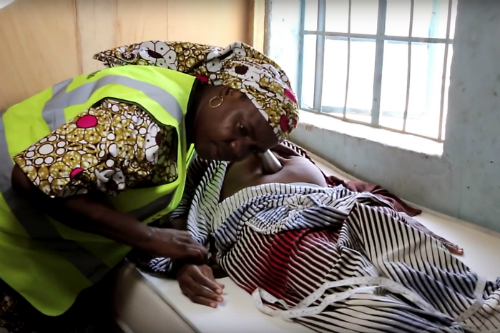News
Two years since the Chibok girls’ abduction: Providing support for women and girls surviving Boko Haram
- 15 April 2016
News
UNITED NATIONS, New York/Chibok, Nigeria – Two years ago, on 14 April, 2014, Boko Haram abducted 276 girls from their dormitory beds at a secondary school in Chibok, Nigeria. Yesterday, on the two-year anniversary of their disappearance, a video surfaced showing 15 of the 219 girls who are still missing standing against a wall in black robes.
They speak calmly, many averting their eyes from the cameraman as they state their names and where they were kidnapped from. It was the first video ‘confirmation of life’ since May 2014.
“[Boko Haram] uses women and girls as a tactic of war. We don’t have to imagine that many of these girls have been subjected to sexual- and gender-based violence,” said UNFPA Executive Director, Babatunde Osotimehin, on 14 April, during a Commission of Population and Development event discussing the ongoing crisis in North-eatern Nigeria. “The girls and all other abductees have been traumatized long enough and must be allowed to return to their families.”
And the Chibok girls are not alone.

In the six years since the conflict with Boko Haram began in the region, as many as 7,000 Nigerian women and girls have been abducted by the insurgents, and approximately 20,000 civilians have died.
In addition, countless communities and villages throughout the impacted areas of Nigeria have been razed during brutal insurgent attacks, resulting in the internal displacement of 2.2 million people, including approximately 461,000 women of reproductive age.
“I heard gunshots and started running,” says Amina, recounting Boko Haram's seige on her village. “The shooting would not stop and went on for hours. There were dead bodies everywhere, but I escaped to a nearby village.”
However, that was not the end of the day’s horrors.
“The insurgents tricked us into a fake reconciliation process to allow those hiding to come out,” she continues. “We found and brought my husband from hiding, and they killed him.” Four of her 12 children also died that day.
With her home and community in rubble, she had no choice but to set out on foot, hoping she and her remaining family members would not encounter Boko Haram again as they searched for help and safety.
After walking 100 kilometres, she found the GGSS Camp for internally displaced persons, supported by UNFPA.

“The magnitude of the problem caused by the insurgency cannot be over-emphasized,” says Dr. Mohammed Aminu Ghuluze, the Ministry of Health’s Director of Emergency Medical Response & Humanitarian Service. “Currently, there are no existing facilities for local governments. They have all been burned down and destroyed, and the remaining public facilities are overstretched.”
UNFPA is working to fill this void and provide impacted women and girls with safe spaces and critical sexual and reproductive health and gender-based violence services, including psychosocial counselling.
A total of 6.2 million people impacted by the crisis in North-eastern Nigeria have received UNFPA-supported services, including 1.1 million women who have received sexual and reproductive health care and the safe delivery of over 63,000 children. In addition, UNFPA has supported psychosocial counselling for approximately 28,000 survivors of gender-based violence and medical treatment for nearly 400 survivors of rape.
And across the region, the need for this support remains urgent. This year alone an estimated 81,689 pregnancies will occur among internally displaced women in North-eastern Nigeria, and tens of thousands of displaced women and girls who have been traumatized by the ongoing brutality, like Amina, will remain in critical need of counselling and support.
“Those who suffer most during insurgencies are women and children,” says Ratidzai Ndhlovu, UNFPA’s Representative in Nigeria. “We started doing psychosocial counselling to be able to give women resilience so they are able to remain strong and continue hoping they will get their beloved ones back if they have been abducted.”
When Amina arrived at GGSS, she was silent and withdrawn, and quickly fell into a deep depression. But she soon began attending UNFPA-supported community psychosocial counselling sessions, where she has been able to discuss her trauma with women and girls who offer support and stories of their own.
And on a recent, sunny afternoon, after emerging from one such session into the crowded campground, Amina lifted a small baby, bouncing the child slightly, and suddenly flashing a broad smile, as a slight but unmistakable light appeared in her eyes.